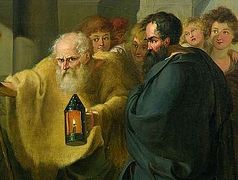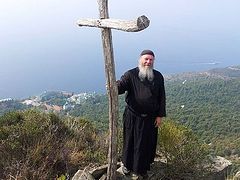 Archpriest Alexander Torik The famous Orthodox writer Archpriest Alexander Torik shares his memories and pastoral experience and reflects upon how a confessor differs from a spiritual father and what temptation are the most dangerous for a spiritual father and his spiritual children.
Archpriest Alexander Torik The famous Orthodox writer Archpriest Alexander Torik shares his memories and pastoral experience and reflects upon how a confessor differs from a spiritual father and what temptation are the most dangerous for a spiritual father and his spiritual children.
—Fr. Alexander, in our last conversation, I asked you about the people who have had the greatest spiritual influence on you, and you listed several remarkable priests, monks, and laymen. Could you tell us more about your encounters with them?
—I could tell a lot about all of these people, but the format of an interview doesn’t really provide such an opportunity. Therefore, I’ll just briefly mention the role each of them played in my life.
Grandma Shura—I called her “grandma-mama”—raised me from a very young age. I was her first and most troublesome grandchild. She was a believer all her life. Her and my grandfather’s wedding icon always hung in the beautiful [prayer] corner of our forty-two-foot room in a communal apartment in Mytischi (where we sometimes had six to eight people living). When I was twelve, I heard the word “Bible” somewhere and asked my grandmother what it was. She answered:
“It’s a book about God. I have the Gospels. It’s also a book about God. Would you like me to give it to you?”
That’s how I got my first Gospel book, printed in 1913 in two languages—Church Slavonic and Russian.
In the 1980s, my aunts, who were communists, tried to pressure me for actively teaching my family about the faith, but then my grandmother told them:
“Girls! Leave Sasha alone—he’s the only one that does everything right.”
Later, my beloved aunts recognized this and began to build their own relationship with God.
Before her death, my grandmother lay paralyzed for five years. She was always hefty, but she got even heavier during this time. She prayed the whole time for all of us, her family, and I understand how many temptations and falls I miraculously escaped by her prayers.
When my grandfather called me to say that Grandma Shura had died, I immediately went and was amazed: on the table lay a beautiful woman (the coffin hadn’t been delivered yet), looking no older than forty-five to sixty years old (she was seventy-seven), with a bright, smiling face.
May you inherit the Kingdom of Heaven, handmaiden of God Alexandra!
I met Andrei Stamboli in a group of friends when I was studying at the Moscow Art Theater School, and he at the Moscow Institute for Theatrical Arts. He didn’t make any impression on me then. A few years later I was working as a janitor at the Main Architectural and Planning Department of Moscow and preparing to enter the youth section of the Artists’ Union (they didn’t accept me, saying there was no place for a boy from the provinces in the capital’s creative environment… The sculptor Dmitry Mitlyansky, who actively supported my admission to the youth section, later said: “This never happened with us before: We voted twice—50/50. Come back in a year.” A year later I didn’t come: Painting had given way to religious life).
I had just moved my paintings for viewing to the reception room (the youth section was on Zholtovsky Street, not far from Mayakovsky Square, where I was working), and they took several of my paintings for an exhibition of works of Planning Department employees (it was a large hall and there was a lot of free space). Since it was my first exhibition, I called all my friends and invited them to come; I also called Andrei. He came, looked around, then sat down to have some tea in the reception booth.
 Schema-Archimandrite Iliy (Nozdrin) I looked at him and couldn’t understand what had changed in him: He had become somehow whole; there was clearly something large and real behind him. It turns out he had begun to live the Church life. We sat for a long time, and in the course of this conversation, Andrei helped me dot the i’s in my religious search, and I became clearly aware of myself as an Orthodox Christian. I will always be grateful to him for his part in my life and I will pray for him.
Schema-Archimandrite Iliy (Nozdrin) I looked at him and couldn’t understand what had changed in him: He had become somehow whole; there was clearly something large and real behind him. It turns out he had begun to live the Church life. We sat for a long time, and in the course of this conversation, Andrei helped me dot the i’s in my religious search, and I became clearly aware of myself as an Orthodox Christian. I will always be grateful to him for his part in my life and I will pray for him.
Batiushka Alexei Polikarpov was the first spiritual mentor for my wife and I for about twenty years. He laid the foundation of my spiritual life and for many years was my guide in this life. I have no words to express my gratitude to him; my love and my prayers will always be with him.
I already said a lot about Fr. Vasily Vladishevsky in our first conversation. I’ll just add that it was in him that I saw an example of how a parish community can become a family, which is what it ideally should be.
Schema-Archimandrite Iliy (Nozdrin), who appeared in my life in a certain period, helped me resolve several very important questions in my (and my family’s) religious life. Knowing how in demand he is, I tried to bother him only with the most important questions, and every time I would receive from him an answer or piece of advice that defined the direction of my spiritual development.
 Archpriest Nikolai Guryanov Archpriest Nikolai Guryanov is the greatest elder whom the Lord has vouchsafed me to communicate with from the moment I began my Church life. His small body worn from fasting contained such a “nuclear reactor” of Divine love that I was literally knocked over when I entered his house. He turned to me and I fell to my knees and began to sob. I didn’t understand what was happening to me.
Archpriest Nikolai Guryanov Archpriest Nikolai Guryanov is the greatest elder whom the Lord has vouchsafed me to communicate with from the moment I began my Church life. His small body worn from fasting contained such a “nuclear reactor” of Divine love that I was literally knocked over when I entered his house. He turned to me and I fell to my knees and began to sob. I didn’t understand what was happening to me.
He only said a few words to me, but this power of Love told me much more—in fact, it told me everything I needed at that moment in my life. The memory of him as a saint who has acquired the grace of the Holy Spirit is ever with me.
Schemamonk Joachim from St. Anne’s Skete on Mt. Athos was the only one who was able to clearly and precisely answer my questions about the Jesus Prayer, which I had been seeking the answers to in Patristic literature and from practitioners—Athonite monks. No one else was able to speak with me on this huge topic so simply, succinctly, and extremely clearly as he did. He had humility, prayer, and Love. May he inherit the Kingdom of Heaven!
 Schemamonk Joachim from St. Anne’s Skete During the period when I was working on books and studying the monastic life in its various forms, the Greek Archimandrite Dionysius (Kalambokas) opened for me a different monasticism compared to what I already knew from my acquaintance with Russian and Athonite monastics. As one hieromonk from his brotherhood said: “I have lived in various monasteries, Russian and otherwise, and learned to eat little, to sleep little, and to pray a lot. But having met Fr. Dionysius, I realized that I hadn’t learned the main thing yet—to love people, without which there is no Christianity.”
Schemamonk Joachim from St. Anne’s Skete During the period when I was working on books and studying the monastic life in its various forms, the Greek Archimandrite Dionysius (Kalambokas) opened for me a different monasticism compared to what I already knew from my acquaintance with Russian and Athonite monastics. As one hieromonk from his brotherhood said: “I have lived in various monasteries, Russian and otherwise, and learned to eat little, to sleep little, and to pray a lot. But having met Fr. Dionysius, I realized that I hadn’t learned the main thing yet—to love people, without which there is no Christianity.”
There’s a film, Geronda, online, which I started and which was perfectly executed by the talented director Tatiana Tarasova. It’s about him.
Fr. Ermolai (Chezhiya) from the Russian St. Panteleimon’s Monastery on Mt. Athos, with his usual happy smile… I dare to consider him my spiritual friend and an example of how humility and prayer bring grace, and grace creates happiness and unceasing joy about Jesus Christ in the heart. Lord! Bless and strengthen Fr. Ermolai! I would like to have him as a friend in eternity.
But the most important person for me, whom the Lord has made into an adviser, mentor, example of sacrificial love, and instrument of my salvation at just the right time, is my precious wife Lyudmila.
—Fr. Alexander, you shared: “In 1984, by the grace of God, I, still an artist then, was led to the village of Aleksino in the Ruza District of the Moscow Province, to the Church of the Protection of the Most Holy Theotokos, as an altar server.” Can you recall how the Lord led you to your pastoral ministry, and what spiritual experiences and temptations you faced on this path?
—I came to my pastoral ministry by coincidence, by my own arrogance, and, of course, by the providence of God. First as an altar sever, then a reader, singer, and Church choir director, I dreamed of becoming a deacon. I collected recordings of famous deacons and got interested in the peculiarities of pre-revolutionary and Old Believer diaconal ministry, imagining how I (my voice was alright) would bellow from the depths during a hierarchical service: “A prosperous and peaceful life…”
The Lord heard my dreams and (like many times) fulfilled them—in 1989, I became a deacon. For two years I enjoyed this glorious angelic service: the first year in Novo-Golutvin Convent, the second in a cathedral where the rector was a priest who later went into schism and was defrocked.
During the year of serving under his rectorship, observing the temptations that took place at the cathedral, I became so distraught by everything I saw that I was ready to flee anywhere I could. But! The rector loved grandeur in the services and would never have released the vociferous deacon for anything, and he was also the dean of the entire district. It was only with moans and groans that he would let someone become a priest, and then because the ruins of churches were being returned en masse, and as the dean he had to fill them with cadres of rectors. It was my only chance to leave the cathedral. And I thought: “What, there are others with much less experience of Church life than me who are ordained, and still—they serve! Can’t I?” (“Oh! Stupidity and arrogance!!!)
I went to see my confessor and described the situation and three possible options: 1. Sit, wait, and not rock the boat. 2. Ask to be a deacon somewhere else (100 percent unrealistic). 3. Write a petition to be ordained as a priest.
My confessor listened, sighed, and said: “Go become a priest…”
So I went. The rest is another story.
—Could you tell us about the spiritual experience you received on pilgrimages to Athos?
—I’ve already written about it in several of my books; I can’t really add anything significant. I’ll just say this: As long as Athos is praying, the world stands.
—From time to time, the topic of pastoral burnout pops up on Orthodox websites. What do you think about this?
—It’s all sad. I understand burnouts, especially those who initially fully immersed themselves in the priestly ministry with all their might and were faced with all the problems of life and ministry in the Church. But… without condemning or reproaching anyone (God forbid!!!): Could Christ have burned out during His three-years of preaching? And faced with the negative side of the religious life of Church servants more than any of us? So you give yourself a kick, and you blow on the embers and throw on some kindling so as not to burn out.
I will soon die (no matter how many years the Lord has already meted out, it’s still just a moment)! Soon! Maybe today I’ll be pulled out in pieces from a wrecked car after an accident, or I’ll take a nap, and a vessel in my head will burst (as with my father), or something else! And suddenly I’ll appear before Christ Who was crucified for me (for me!!!), and will I look Him in the eye?
And I’ll say: Sorry, Lord, I got burned out?
When I took a blessing from my spiritual father for the obedience of altar server way back in 1984, he pointed to the confessional analogion with the Cross and Gospel and said: “This is how you see Church life now,” then he grabbed the edge of the analogion cover and turned the lining up: “Now you’ll see it this way. Look, don’t lose your faith!”
By the grace of God, I haven’t lost it yet, I haven’t burned out, although I’ve seen enough of everything…
 Archpriest Alexander Torik communing his parishioners
Archpriest Alexander Torik communing his parishioners
—Fr. Alexander, what do you think about spiritual mentoring? What kind of mentor can be called a spiritual father? What qualities is it desirable for him to possess? What temptations should we avoid? Could you share some examples from your personal experience?
—Happy are those who have received from God the great gift of a good spiritual father! I have had and have this gift, glory to God!
The one for whom you are a native son or daughter you can call your spiritual father, who loves you and takes care for your salvation as for his own child. The rest are just confessors, guides, advisers, and so on.
The most important quality that a spiritual father should possess is love, and secondly—responsibility. The rest will follow if the spiritual father and his spiritual children try to live according to the Gospel and to pray for one another.
There are many temptations in the relationship between a spiritual father and his children; I won’t list them all, but the main one is insincerity.
From my personal experience: “How should I bless you: how I think is correct, or how you want it?”
—You have written that you live in Albufeira now. Why did you choose Portugal? What interested you in this country? Tell us, if you can, about your impressions, acquaintances, and travel experiences.
—God’s providence is unfathomable. Had you told me ten years ago that I’d be living in Portugal and running a spiritual-cultural center, I would have fainted.
But, I live here and I run the center, as best I can.
The first thing I heard about Portugal, fifteen years ago, on Mt. Athos, in the guesthouse, from a pilgrim—a Russian citizen of Portugal—to my question: “What kind of country is Portugal?” was: “A poor country, but the people are kind.”
And then all of a sudden—I live here! Somehow it just happened: I was looking for shelter from the winter (on doctors’ recommendations), and I thought about Greece, Italy, even Sicily (it’s warmer there), and suddenly—bam! Portugal!
Only once I was already here and I saw what a deficit of priests there is and what need for them there is for the Russian-speaking diaspora did I realize that the Lord led me here for a reason. In a land without priests, even an invalid priest will do. The dean of the churches in Portugal, Fr. John, asked for help, and Vladyka allowed it. I help as I can, while I can. As for tomorrow—as the Lord blesses! We’ll see what happens!
 Fr. Alexander with parishioners of the International Holy Protection Christian Spiritual-Cultural Center
Fr. Alexander with parishioners of the International Holy Protection Christian Spiritual-Cultural Center
And the country really is not rich and the people are mostly friendly.
It’s a beautiful country, but not with a bright, outstanding beauty (like Greece or Italy), but a kind of modest, internal, deep beauty. The spirit of the country and the locals is peaceful, which is unusual for us Russians (especially Muscovites). There’s no aggression—especially not like we have in Russia—on the roads among drivers; there’s no desire to look cool or rich and generally to show off and to seem like something you’re not. There are many different visitors of all skin colors and eye shapes, and they are all completely calm and respectful to one another. But as for problems—well, where do they not have them?
And there are many retirees from different countries of northern Europe, especially visible in winter, at the end of the tourist season—old men and old women hold hands along the beach. Sometimes Matushka and I do too.
Glory to God for all things!






